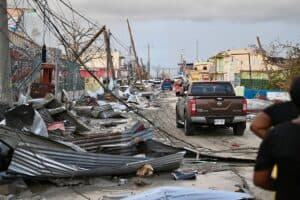Haiti has been wracked by spiralling violence, a worsening public health situation and political instability.

On a visit to spotlight violence and chaos in Haiti, the UN secretary-general on Saturday called for a robust international effort to help the country’s beleaguered police in fighting rampant criminal gangs.
For months, Antonio Guterres has raised the alarm bell about the situation in the Western Hemisphere’s poorest country, which has been wracked by spiralling violence, a worsening public health situation and political instability.
But he traveled to Port-au-Prince – his first visit to Haiti as head of the United Nations – to make his point on the ground.
“We must put Haiti on the international political map, and make the tragedy of the Haitian people the international community’s top priority,” Guterres told a press conference.
“I met Haitians, and I felt the exhaustion of a population that has been facing a cascade of crises and unbearable living conditions for too long,” he said.
“This is not the time to forget about Haiti,” Guterres said after meeting with Prime Minister Ariel Henry, and other political and civil society leaders.
Guterres urged the UN Security Council, which is due to discuss the Haiti situation later this month, “to authorize the immediate deployment of a robust international security force.”
In October, he relayed Henry’s request for a non-UN force to support the overwhelmed national police force.
But the call has gone unheeded. A few countries have indicated their willingness to participate, but none has volunteered to lead an operation in a country where multiple past foreign interventions have become mired.
“I call on those states that have the capacity to provide a robust security force to stop hesitating and be ready to follow a Security Council decision,” Guterres said.
“Every day counts. If we don’t act now, instability and violence will have a lasting impact on generations of Haitians.”
‘Widespread sexual violence’
UN officials in recent months have offered increasingly grim assessments of the impact of gang shootings, kidnappings and rapes on the Haitian population.
“Port-au-Prince is surrounded by armed gangs blocking the main roads leading to the northern and southern departments, controlling access to water, food and health care,” Guterres said Saturday.
He condemned “in the strongest possible terms the widespread sexual violence used by armed gangs as a weapon to instill fear.”
Earlier in the week, UNICEF executive director Catherine Russell said after a trip to Port-au-Prince that the world was “failing the Haitian people.”
She recounted the horrific story of an 11-year-old girl who was kidnapped by five men — and raped by three of them.
“She was eight months pregnant when we spoke and gave birth just a few days later,” Russell said, recalling that armed gangs control more than 60 percent of the capital and large swathes of the countryside.
Almost half the population, or 5.2 million people, are in need of humanitarian assistance, including almost three million children.
No elections have been held since 2016, and Henry, appointed prime minister just days before the assassination of president Jovenel Moise in July 2021, faces questions about his legitimacy.
Guterres said he had “frank exchanges” with Henry and others about the “need for a political agreement to put an end to the crisis,” without offering specifics.
He called on civic leaders to “overcome their personal interests and make concessions in order to facilitate the emergence of a common vision and a viable and credible electoral path.”
After Haiti, Guterres travels to Trinidad and Tobago for a Caribbean Community (Caricom) summit, where issues surrounding Haiti will be discussed.
US Secretary of State Antony Blinken also will attend the summit.






